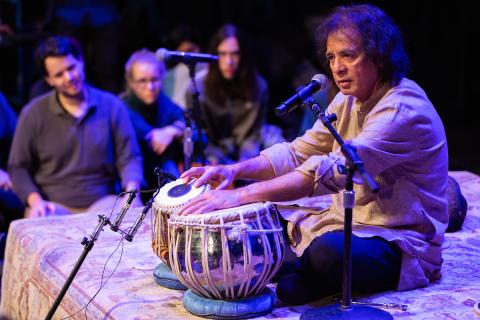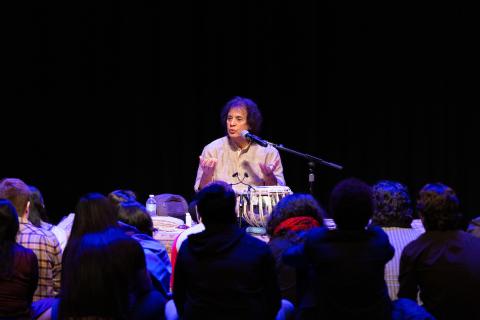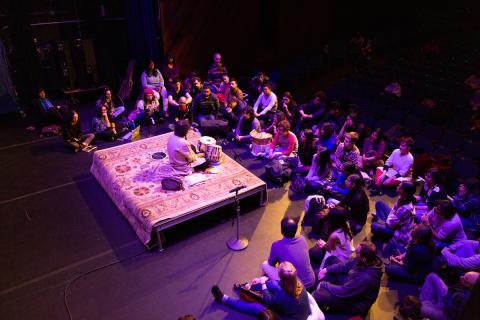Zakir Hussain and the Art of Forgetting

Tabla virtuoso Zakir Hussain shared thoughts on Indian music, tabla technique, and improvisation at a recent master class.
Image by Mike Spencer

Hussain worked with students the week leading up to a ceremony and concert honoring him with a Berklee honorary doctorate.
Image by Mike Spencer

Students gathered on the stage around Hussain for an up close and personal educational experience with the tabla master.
Image by Mike Spencer
To hear the Grammy-winning tabla master Zakir Hussain '19H talk about his instrument, it can sound like he’s speaking about a respected loved one. In fact, he points out that your instrument is an extension of your body, which is itself where all music originates. As he said in a recent master class hosted by the Berklee India Exchange ahead of his sold-out Signature Series performance, “The body is an instrument. Playing music is basically whatever your body is doing—bringing it out onto either an instrument you are playing or [through] your singing. This is the basis of improv—the body.”
“In many ways, Indian music and jazz are cousins, simply because we both improvise. We believe in spontaneity."
—Zakir Hussain '19H
Known around the world for his fusion jazz improvisation prowess in groups such as Shakti, Hussain talked about, at age 11, seeing Duke Ellington play live in 1962 in what was then Bombay (now Mumbai), and how Western jazz influences worked their way into Indian music by way of Bollywood cinematic scores. The relationship between the musics was natural, according to Hussain. “In many ways, Indian music and jazz are cousins, simply because we both improvise. We believe in spontaneity. We believe in being impulsive, creative in that manner.”
Thinking Faster than the Rhythm
Hussain described his control of rhythm while in improvisational settings in surprisingly (and also, one guesses, deceptively) simplistic terms, comparing it to a language he had internalized since he was very young. He shared how his father, the legendary tabla player Allah Rakha, would send Zakir to school, instructing him to “recite riffs” as he walked. This kind of deep familiarity allowed him to more easily find structure in improvisation, helping to “think faster than [my] hands,” or be able to sense shifts in the music before they occur.
Combining Technique and Artistic Risk
After explaining parts of his approach, he asked, “Am I really improvising?” saying that all he’s doing is finding phrases and variations on those phrases within a particular musical structure. “The process is simple,” he added, “but to actually put it into action requires ironclad, solid time” as well as the courage to take risks. The great players, he said, “reach for the sky—they’re not just resting on the tried and true.” And so, his parting advice to all the musicians in the room was to take all the technical skill and push yourself into less structured territory. “Learn every riff, learn every standard, learn all the solos, and put it all together in your head. And then get on the stage and forget all that.”